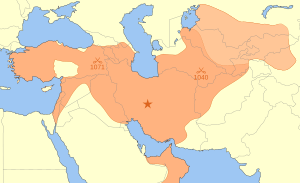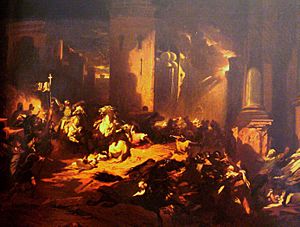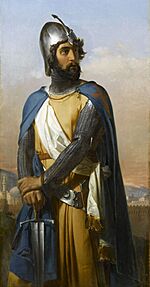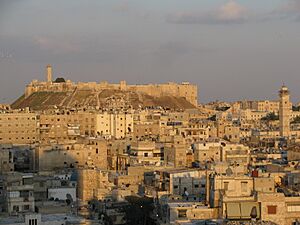Fakhr al-Mulk Ridwan facts for kids
Quick facts for kids Ridwan |
|||||
|---|---|---|---|---|---|
| Emir of Aleppo | |||||
| Reign | 1095–1113 | ||||
| Predecessor | Tutush I | ||||
| Successor | Alp Arslan al-Akhras | ||||
| Born | c. 1077 | ||||
| Died | 10 December 1113 Aleppo |
||||
| Burial | Meşhedülmelik | ||||
| Consort | Jijak Khatun | ||||
| Issue | Alp Arslan al-Akhras Malik Shah Mubarak Shah Sultan Shah Farkhunda Khatun Amina Khatun |
||||
|
|||||
| House | Seljuk | ||||
| Father | Tutush I | ||||
| Mother | Safwat ul-Mulk Khatun | ||||
| Religion | Sunni Islam | ||||
Ridwan (c. 1077 – 10 December 1113) was a Seljuk ruler, known as an emir, who governed Aleppo from 1095 until his death. His full name was Fakhr al-Mulk Ridwan ibn Tutush. He became a powerful figure in Syria during a time of great change. This period included the arrival of the First Crusade in the Middle East.
Ridwan was the son of Tutush I, a Seljuk prince. His father had created a small kingdom in Syria. This happened after his brother, Sultan Malik-Shah I, gave him the area to rule. After Malik-Shah died, Tutush tried to become the main Seljuk ruler. However, he was killed in a battle in 1095. After his father's death, Ridwan moved to Aleppo and declared himself the new emir. His brother, Duqaq, then started his own rule in Damascus. This split the Seljuk lands in Syria into two rival parts. The brothers often fought each other, even when the Crusaders arrived in 1097. Ridwan tried to deal with the Crusaders using money. He also fought against the Principality of Antioch, a Crusader state. This state was set up after the Siege of Antioch in 1098.
Contents
Early Life and Family
Fakhr al-Mulk Ridwan was born around 1077. He was the oldest of five sons. His father was Tutush I, who was the brother of the powerful Seljuk Sultan Malik-Shah I. In 1078, Sultan Malik-Shah sent Tutush to conquer and rule Syria. This created a new Seljuk kingdom there.
Tutush captured Aleppo in 1079. He also took control of Damascus, Jerusalem, and other important cities. This led to the creation of the Syrian Seljuk State. Tutush also fought against other rulers, like Suleiman ibn Qutalmish, the Seljuk Sultan of Rum. Tutush defeated and killed Suleiman in a battle near Aleppo in 1086.
Sultan Malik-Shah died in 1092. There were no adult princes ready to take over the large Seljuk Empire. Tutush tried to claim the throne, but he did not get much support. He captured cities like Mosul and Aleppo. However, his nephew Berkyaruq's forces killed him in 1095.
Ridwan Becomes Ruler
Ridwan learned about his father's death while he was away. He quickly returned to Aleppo and took control of the Syrian Seljuk throne. The ruler of Antioch, Yaghi-Siyan, supported Ridwan. He even gave his daughter to Ridwan in marriage.
Rivalry with His Brother
Ridwan was worried that his brothers might try to take his power. He had two of his brothers, Abu Talib and Behram, killed. His other brother, Duqaq, secretly left Aleppo. Duqaq went to Damascus and started his own separate state there. Ridwan did not accept Duqaq's rule. He said he was the only true ruler of the Syrian Seljuks. Ridwan then tried to capture Damascus, but he failed. This split the Syrian Seljuk state into two rival parts: Aleppo and Damascus.
In 1096, Ridwan tried to expand his lands. He attacked Suruç and Edessa, capturing Edessa. He also took Turbessel. Ridwan tried to capture Damascus again when Duqaq was away. But he had to stop when he heard Duqaq's army was coming back. Duqaq then attacked Aleppo's lands. Ridwan defeated him in a battle in 1097.
At one point, Ridwan agreed to support the Fatimid Caliphate in Egypt. This was in exchange for military help against his brother. However, this upset the Sunni leaders in his own lands. A month later, Ridwan changed his mind. He went back to supporting the Sunni Abbasid caliph and the Seljuk sultan.
Facing the Crusaders
When the First Crusade arrived, they marched towards Antioch. The governor of Antioch, Yaghi-Siyan, asked for help from Muslim leaders. Ridwan was not eager to help. He sent only a small group of soldiers. His brother Duqaq and other leaders did join the fight.
Ridwan led an army to help Antioch. They took back the town of Harem. But when they got close to Antioch, the Crusaders attacked. The Crusaders, led by Bohemond of Taranto, defeated Ridwan's forces. Ridwan's army had to retreat. The Crusaders then captured Antioch in June 1098. They set up their own state there. They also took other towns around Aleppo. Bohemond defeated Ridwan again in 1100.
Alliance with Tancred
Ridwan often tried to get the Crusaders to leave by paying them gold. Tancred, who was ruling Antioch, made peace with Ridwan. In return, Ridwan gave him a large amount of gold, cattle, and sheep. Ridwan also benefited when another Muslim leader defeated the Crusaders in 1104. This allowed Ridwan to take back some cities.
Ridwan's brother and rival, Duqaq, died in 1104. After this, Ridwan tried to take control of Damascus. But Duqaq's son and then another Turkish leader took over Damascus.
In 1105, Ridwan tried to help the ruler of Tripoli against the Crusaders. But he had to turn back when he heard Tancred was attacking Artah. Ridwan refused peace with Tancred and was defeated in the Battle of Artah. Tancred then attacked and looted the areas around Aleppo.
These events made Ridwan ally with other Muslim leaders against their enemies. He even allied with Tancred against the emir of Mosul, Chavli Saqaveh. Ridwan and Tancred's armies fought against Chavli and his allies in 1108. They defeated them in a battle near Turbessel.
Later, Ridwan's situation got worse. Tancred attacked areas east of Aleppo. Ridwan had to pay Tancred a lot of money and give him some fortresses. This agreement caused a famine around Aleppo. Ridwan had to sell his own lands cheaply to help his people.
The people of Aleppo were very unhappy. A religious leader named Ibn al-Khashshab led a protest. This happened when Tancred forced Ridwan to put a cross in the main mosque of Aleppo. Tancred was also stopping trade routes and stealing from Syria. Ridwan did not have enough power to fight Tancred alone. So, Ibn al-Khashshab suggested sending a group of important people to the Seljuk Sultan in Baghdad. Ridwan agreed.
The Sultan started military campaigns against the Crusaders. Ridwan tried to avoid fighting as much as possible. He even bought a pardon from the Crusaders. This made his people and other Muslim rulers angry. Ridwan asked the Sultan's army to come to Aleppo. But he did not let them inside the city. He also arrested Ibn al-Khashshab. The Sultan's army left Syria in 1111 without fighting a major battle.
His Final Years and Legacy
Ridwan's money problems continued to get worse. He tried to take money from a merchant, which hurt his reputation. In 1112, Ridwan signed a peace treaty with the ruler of Damascus, Toghtekin. This treaty recognized Ridwan's rule over Damascus. However, when the King of Jerusalem attacked Damascus, Ridwan sent very little help. This angered Toghtekin.
Ridwan died on 10 December 1113 in Aleppo. He was buried in Meşhedülmelik. After his death, groups of armed citizens in Aleppo attacked Ridwan's supporters. Many were killed or imprisoned.
Ridwan's 16-year-old son, Alp Arslan, became the new ruler. Alp Arslan was nicknamed al-Akhras (The Mute) because he stuttered. His rule, and the rule of his younger brother, were mostly controlled by a powerful official named Lu'lu' al-Yaya.
The Seljuk Sultan warned Alp Arslan about the dangers of certain groups. Alp Arslan then took strong actions against them. He had many of their leaders and members killed or imprisoned. He also executed two of his brothers and other officials. This made the people of Aleppo uncomfortable. Alp Arslan was killed in 1114. After this, there was a period of disorder in Aleppo. The rule of the Seljuk dynasty in Aleppo ended in 1118.
See also
 In Spanish: Fakhr al-Mulk Radwan para niños
In Spanish: Fakhr al-Mulk Radwan para niños





